19 jan 2019
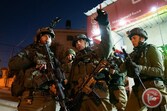
Israeli forces detained five Palestinian minors, during clashes in the village of Tuqu, in the southern occupied West Bank district of Bethlehem, on Friday evening.
Head of the Tuqu Municipality, Taysir Abu Mifreh, said that clashes erupted between locals and Israeli soldiers deployed at the entrance of the village.
Israeli forces fired rubber-coated steel bullets and tear-gas bombs to suppress protesters before arresting five minors.
According to prisoners rights group Addameer, there are 5,500 Palestinian prisoners being held in Israeli prisons, of whom 230 are child prisoners and 41 are under the age of 16 years.
Head of the Tuqu Municipality, Taysir Abu Mifreh, said that clashes erupted between locals and Israeli soldiers deployed at the entrance of the village.
Israeli forces fired rubber-coated steel bullets and tear-gas bombs to suppress protesters before arresting five minors.
According to prisoners rights group Addameer, there are 5,500 Palestinian prisoners being held in Israeli prisons, of whom 230 are child prisoners and 41 are under the age of 16 years.
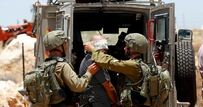
The Israeli occupation forces (IOF) at dawn Saturday arrested a number of Palestinians during West Bank sweeps.
Local sources said that the IOF raided different neighborhoods in al-Khalil, fired sound bombs at Palestinian homes, and arrested Hasan al-Najjar, 21.
The IOF launched a similar campaign in Nahalin and Tuqu' towns in Bethlehem, arrested the Palestinian youths Mohammed Murad and Khalil Sha'aban, and transferred them to an unknown destination.
Meanwhile in Jerusalem, the Israeli police arrested a Palestinian and injured four during a raid on Silwan town.
Wadi Hilweh Information Center said that a group of Israeli settlers insulted and verbally attacked Palestinian youths on al-Ain street before the Israeli police intervened and attacked the Palestinians.
Four Palestinians were injured as the police heavily fired sound bombs and rubber-coated metal bullets in the area.
Wadi Hilweh added that the Israeli police arrested Eyad Ghaith in Silwan and took him to a nearby detention center.
The police further detained a Jerusalemite child, insulted him, and beat him before he was released hours later.
Local sources said that the IOF raided different neighborhoods in al-Khalil, fired sound bombs at Palestinian homes, and arrested Hasan al-Najjar, 21.
The IOF launched a similar campaign in Nahalin and Tuqu' towns in Bethlehem, arrested the Palestinian youths Mohammed Murad and Khalil Sha'aban, and transferred them to an unknown destination.
Meanwhile in Jerusalem, the Israeli police arrested a Palestinian and injured four during a raid on Silwan town.
Wadi Hilweh Information Center said that a group of Israeli settlers insulted and verbally attacked Palestinian youths on al-Ain street before the Israeli police intervened and attacked the Palestinians.
Four Palestinians were injured as the police heavily fired sound bombs and rubber-coated metal bullets in the area.
Wadi Hilweh added that the Israeli police arrested Eyad Ghaith in Silwan and took him to a nearby detention center.
The police further detained a Jerusalemite child, insulted him, and beat him before he was released hours later.
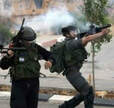
A soccer match between two local teams was suspended on Friday, after Israeli soldiers fired teargas canisters into Al-Khader Stadium, to the south of Bethlehem, in the occupied West Bank.
Sa’di Hmeidan, a local sports official, told WAFA that Israeli soldiers fired teargas canisters inside the stadium, during a match between the soccer teams of Al-Abidia and Doha villages, as part of a youth football league.
He said that some of the players suffocated from the teargas, causing the match to be suspended. The match was resumed in about an hour.
Israeli occupation forces, on Friday, also detained five Palestinian teenagers during clashes in the village of Taqou, to the southeast of Bethlehem, local sources said.
Tayseer Abu Mfarreh, director of Taqou municipality, said that confrontations erupted between protesters and Israeli forces, at the entrance to the village, adding that the soldiers attacked the protesters with rubber-coated steel bullets and teargas before abducting five of them.
Israeli settlers, on Friday, uprooted and chopped 20 Palestinian-owned olive trees near the village of al-Mughayer, northeast of Ramallah, in the occupied West Bank, a local activist reported.
Faraj Na’san, former head of al-Mughayer village council, said that Jewish settlers from neighboring illegal settlements uprooted and chopped the olive trees belonging to the Na’san family, noting that the trees were there for over 30 years.
He said that the act of uprooting olive trees has been frequent in that area, as part of a plan to make life difficult for Palestinians, in order to get them to leave and expand their settlements, built illegally on Palestinian lands.
Settler violence, against Palestinians and their property, is routine in the West Bank, and is rarely prosecuted by Israeli authorities.
Between 500,000 and 600,000 Israelis live in Jewish-only settlements across occupied East Jerusalem and the West Bank in violation of international law.
Sa’di Hmeidan, a local sports official, told WAFA that Israeli soldiers fired teargas canisters inside the stadium, during a match between the soccer teams of Al-Abidia and Doha villages, as part of a youth football league.
He said that some of the players suffocated from the teargas, causing the match to be suspended. The match was resumed in about an hour.
Israeli occupation forces, on Friday, also detained five Palestinian teenagers during clashes in the village of Taqou, to the southeast of Bethlehem, local sources said.
Tayseer Abu Mfarreh, director of Taqou municipality, said that confrontations erupted between protesters and Israeli forces, at the entrance to the village, adding that the soldiers attacked the protesters with rubber-coated steel bullets and teargas before abducting five of them.
Israeli settlers, on Friday, uprooted and chopped 20 Palestinian-owned olive trees near the village of al-Mughayer, northeast of Ramallah, in the occupied West Bank, a local activist reported.
Faraj Na’san, former head of al-Mughayer village council, said that Jewish settlers from neighboring illegal settlements uprooted and chopped the olive trees belonging to the Na’san family, noting that the trees were there for over 30 years.
He said that the act of uprooting olive trees has been frequent in that area, as part of a plan to make life difficult for Palestinians, in order to get them to leave and expand their settlements, built illegally on Palestinian lands.
Settler violence, against Palestinians and their property, is routine in the West Bank, and is rarely prosecuted by Israeli authorities.
Between 500,000 and 600,000 Israelis live in Jewish-only settlements across occupied East Jerusalem and the West Bank in violation of international law.
|
|
Date: 18 January 2019, The Palestinian Center For Human Right (PCHR): On Friday evening, 18 January 2019, Israeli forces wounded 119 Palestinian civilians, including 30 children, 5 women, 5 paramedics, and 2 journalists, in the peaceful demonstrations in the eastern Gaza Strip despite the decreasing intensity of the demonstrations there for the twelfth week consecutively and absence of most means usually used during the demonstrations since the beginning of the Return and Breaking the Siege March 10 months ago.
According to observations by PCHR’s fieldworkers, though the demonstrators were around tens of meters away from the border fence, the Israeli forces who stationed in prone positions and in military jeeps along the fence continued to use excessive force against the demonstrators by opening fire and firing teargas canisters at them. |
As a result, many of the demonstrators were hit with bullets and teargas canisters to their head without posing any imminent threat or danger to the life of soldiers.
On this Friday, the Israeli forces have increasingly targeted the medical personnel in the field and wounded 5 of them, including 2 female and male paramedics in eastern Khan Yunis, 2 female paramedics in eastern Jabalia and a paramedic in eastern al-Buriej camp.
Moreover, the Israeli forces fired a barrage of teargas canisters near where ambulances were parked in Khan Younis. All of this indicates an Israeli systematic policy to target the medical personnel and obstruct their humanitarian action that is guaranteed with protection under the international humanitarian law.
On 18 January 2019, the incidents were as follows:
At approximately 14:30, thousands of civilians, including women, children and entire families, started swarming to the five encampments established by the Supreme National Authority of Great March of Return and Breaking the Siege adjacent to the border fence with Israel in eastern Gaza Strip cities, except for northern Gaza due to bad weather.
Hundreds, including children and women, approached the border fence with Israel in front of each encampment and gathered tens of meters away from the main border fence, attempting to throw stones at the Israeli forces. Although the demonstrators gathered in areas open to the Israeli snipers stationed on the top of the sand berms and military watchtowers and inside and behind the military jeeps, the Israeli forces fired live and rubber bullets in addition to a barrage of teargas canisters.
The Israeli shooting, which continued at around 17:00, resulted in the injury of 119 civilians, including 30 children, 5 women, 5 paramedics, and 2 journalists. In addition, dozens of demonstrators, paramedics and journalists suffered tear gas inhalation and seizures due to tear gas canisters that were fired by the Israeli forces from the military jeeps and riffles in the eastern Gaza Strip.
The following table shows the number of civilian victims due to the Israeli forces’ suppression of the Great March of Return since its beginning on 30 March:
Notes Medical Crews Journalists Women Children Total Casualties
Among those Killed, there were 8 Persons with
Disabilities and a girl. 3 2 2 36 183 Killed
Among those wounded, 514 are in serious
condition and 101 had their lower or upper
limbs amputated; 89 lower-limb amputations,
2 upper-limb amputations, 10 finger amputations
and 17 children had their limbs amputated
according to the Ministry of Health.
The number of those wounded only include 165 173 303 1907 10,391 Wounded
those wounded with live bullets and directly
hit with tear gas canisters as there have been
thousand others who suffered tear gas inhalation
and sustained bruises.
PCHR emphasizes that continuously targeting civilians, who exercise their right to peaceful assembly or while carrying out their humanitarian duty, is a serious violation of the rules of international law, international humanitarian law, the ICC Rome Statute and Fourth Geneva Convention. Thus, PCHR calls upon the ICC Prosecutor to open an official investigation in these crimes and to prosecute and hold accountable all those applying or involved in issuing orders within the Israeli Forces at the security and political echelons.
PCHR hereby condemns the excessive use of force and commission of crimes by the Israeli forces despite the prevailed calmness, believing it is as a result of Israel’s enjoying impunity thanks to the U.S. and so encouraging the Israeli forces to commit further crimes upon an official decision by the highest military and political echelons.
PCHR also reiterates its call upon the High Contracting Parties to the 1949 Fourth Geneva Convention to fulfill their obligations under Article 1; i.e., to respect and ensure respect for the Convention in all circumstances and their obligations under Article 146 to prosecute persons alleged to commit grave breaches of the Fourth Geneva Convention.
PCHR calls upon Switzerland, in its capacity as the Depository State for the Convention, to demand the High Contracting Parties to convene a meeting and ensure Israel’s respect for this Convention, noting that these grave breaches constitute war crimes under Article 147 of the same Convention and Protocol (I) Additional to the Geneva Conventions regarding the guarantee of Palestinian civilians’ right to protection in the occupied territories.
Public Document
**************************************
Follow PCHR on Facebook and Twitter
For more information please call PCHR office in Gaza, Gaza Strip, on +972 8 2824776 – 2825893
Gaza- Jamal ‘Abdel Nasser “al-Thalathini” Street – Al-Roya Building- Floor 12 , El Remal, PO Box 1328 Gaza, Gaza Strip. E-mail: [email protected], Webpage http://www.pchrgaza.org
On this Friday, the Israeli forces have increasingly targeted the medical personnel in the field and wounded 5 of them, including 2 female and male paramedics in eastern Khan Yunis, 2 female paramedics in eastern Jabalia and a paramedic in eastern al-Buriej camp.
Moreover, the Israeli forces fired a barrage of teargas canisters near where ambulances were parked in Khan Younis. All of this indicates an Israeli systematic policy to target the medical personnel and obstruct their humanitarian action that is guaranteed with protection under the international humanitarian law.
On 18 January 2019, the incidents were as follows:
At approximately 14:30, thousands of civilians, including women, children and entire families, started swarming to the five encampments established by the Supreme National Authority of Great March of Return and Breaking the Siege adjacent to the border fence with Israel in eastern Gaza Strip cities, except for northern Gaza due to bad weather.
Hundreds, including children and women, approached the border fence with Israel in front of each encampment and gathered tens of meters away from the main border fence, attempting to throw stones at the Israeli forces. Although the demonstrators gathered in areas open to the Israeli snipers stationed on the top of the sand berms and military watchtowers and inside and behind the military jeeps, the Israeli forces fired live and rubber bullets in addition to a barrage of teargas canisters.
The Israeli shooting, which continued at around 17:00, resulted in the injury of 119 civilians, including 30 children, 5 women, 5 paramedics, and 2 journalists. In addition, dozens of demonstrators, paramedics and journalists suffered tear gas inhalation and seizures due to tear gas canisters that were fired by the Israeli forces from the military jeeps and riffles in the eastern Gaza Strip.
The following table shows the number of civilian victims due to the Israeli forces’ suppression of the Great March of Return since its beginning on 30 March:
Notes Medical Crews Journalists Women Children Total Casualties
Among those Killed, there were 8 Persons with
Disabilities and a girl. 3 2 2 36 183 Killed
Among those wounded, 514 are in serious
condition and 101 had their lower or upper
limbs amputated; 89 lower-limb amputations,
2 upper-limb amputations, 10 finger amputations
and 17 children had their limbs amputated
according to the Ministry of Health.
The number of those wounded only include 165 173 303 1907 10,391 Wounded
those wounded with live bullets and directly
hit with tear gas canisters as there have been
thousand others who suffered tear gas inhalation
and sustained bruises.
PCHR emphasizes that continuously targeting civilians, who exercise their right to peaceful assembly or while carrying out their humanitarian duty, is a serious violation of the rules of international law, international humanitarian law, the ICC Rome Statute and Fourth Geneva Convention. Thus, PCHR calls upon the ICC Prosecutor to open an official investigation in these crimes and to prosecute and hold accountable all those applying or involved in issuing orders within the Israeli Forces at the security and political echelons.
PCHR hereby condemns the excessive use of force and commission of crimes by the Israeli forces despite the prevailed calmness, believing it is as a result of Israel’s enjoying impunity thanks to the U.S. and so encouraging the Israeli forces to commit further crimes upon an official decision by the highest military and political echelons.
PCHR also reiterates its call upon the High Contracting Parties to the 1949 Fourth Geneva Convention to fulfill their obligations under Article 1; i.e., to respect and ensure respect for the Convention in all circumstances and their obligations under Article 146 to prosecute persons alleged to commit grave breaches of the Fourth Geneva Convention.
PCHR calls upon Switzerland, in its capacity as the Depository State for the Convention, to demand the High Contracting Parties to convene a meeting and ensure Israel’s respect for this Convention, noting that these grave breaches constitute war crimes under Article 147 of the same Convention and Protocol (I) Additional to the Geneva Conventions regarding the guarantee of Palestinian civilians’ right to protection in the occupied territories.
Public Document
**************************************
Follow PCHR on Facebook and Twitter
For more information please call PCHR office in Gaza, Gaza Strip, on +972 8 2824776 – 2825893
Gaza- Jamal ‘Abdel Nasser “al-Thalathini” Street – Al-Roya Building- Floor 12 , El Remal, PO Box 1328 Gaza, Gaza Strip. E-mail: [email protected], Webpage http://www.pchrgaza.org
18 jan 2019
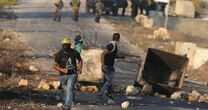
Violent confrontations broke out on Friday between Palestinian citizens and the Israeli occupation forces in Jabal al-Risan area in Ramallah.
The Israeli forces heavily fired teargas canisters at the Palestinians protesting an Israeli order to confiscate Palestinian-owned lands in Jabal al-Risan.
Dozens of protesters choked on teargas, while a young man was injured by a rubber-coated metal bullet in the leg.
Israeli security restrictions have been tightened lately in Jabal al-Risan to provide protection to the Israeli settlers who have, so far, seized 50 dunums of its land.
The Israeli forces heavily fired teargas canisters at the Palestinians protesting an Israeli order to confiscate Palestinian-owned lands in Jabal al-Risan.
Dozens of protesters choked on teargas, while a young man was injured by a rubber-coated metal bullet in the leg.
Israeli security restrictions have been tightened lately in Jabal al-Risan to provide protection to the Israeli settlers who have, so far, seized 50 dunums of its land.
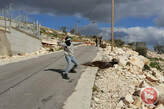
Two Palestinians were injured, while a minor was detained by Israeli forces, and several others suffered tear-gas suffocation Israeli forces suppressed the weekly Kafr Qaddum march in the northern occupied West Bank, on Friday.
Coordinator of a local popular committee of Kafr Qaddum, Murad Ishteiwi, said that Israeli soldiers opened live fire, rubber-coated steel bullets and tear-gas bombs to suppress protesters, injuring two Palestinians.
One Palestinians was injured in the chest and another in the leg; both were transferred to a hospital for treatment.
Israeli forces raided a Palestinian home, belonging to Nusfat Ishteiwi, after opening live fire at its front door; Israeli soldiers also opened fire inside the house, damaging property and windows of the house.
Israeli forces reportedly assaulted women and children before detaining 14-year-old Tareq Hikmat Ishteiwi. video
Residents of Kafr Qaddum began staging weekly protests in 2011 against Israeli land confiscations, as well as the closure of the village's southern road by Israeli forces. The road, which has been closed for 14 years, is the main route to the nearby city of Nablus, the nearest economic center.
The Israeli army blocked off the road after expanding the illegal Israeli settlement of Kedumim in 2003, forcing village residents to take a bypass road in order to travel to Nablus, which has extended the travel time to Nablus from 15 minutes to 40 minutes, according to Israeli rights group B'Tselem.
Coordinator of a local popular committee of Kafr Qaddum, Murad Ishteiwi, said that Israeli soldiers opened live fire, rubber-coated steel bullets and tear-gas bombs to suppress protesters, injuring two Palestinians.
One Palestinians was injured in the chest and another in the leg; both were transferred to a hospital for treatment.
Israeli forces raided a Palestinian home, belonging to Nusfat Ishteiwi, after opening live fire at its front door; Israeli soldiers also opened fire inside the house, damaging property and windows of the house.
Israeli forces reportedly assaulted women and children before detaining 14-year-old Tareq Hikmat Ishteiwi. video
Residents of Kafr Qaddum began staging weekly protests in 2011 against Israeli land confiscations, as well as the closure of the village's southern road by Israeli forces. The road, which has been closed for 14 years, is the main route to the nearby city of Nablus, the nearest economic center.
The Israeli army blocked off the road after expanding the illegal Israeli settlement of Kedumim in 2003, forcing village residents to take a bypass road in order to travel to Nablus, which has extended the travel time to Nablus from 15 minutes to 40 minutes, according to Israeli rights group B'Tselem.
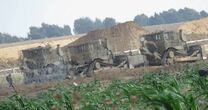
The Israeli occupation army on Friday morning launched a limited incursion into Rafah city in the southern area of the Gaza Strip.
The PIC reporter said that four Israeli military bulldozers moved a few hundred meters into Rafah and leveled Palestinian-owned farmlands.
The military incursion came hours before the kick off of the Great March of Return demonstrations on Gaza border for the 43rd Friday in a row.
The Israeli army on a regular basis carries out incursions and shooting attacks on the border areas of the Gaza Strip, violating the ceasefire understandings reached between Israel and Palestinian resistance groups in 2014.
The PIC reporter said that four Israeli military bulldozers moved a few hundred meters into Rafah and leveled Palestinian-owned farmlands.
The military incursion came hours before the kick off of the Great March of Return demonstrations on Gaza border for the 43rd Friday in a row.
The Israeli army on a regular basis carries out incursions and shooting attacks on the border areas of the Gaza Strip, violating the ceasefire understandings reached between Israel and Palestinian resistance groups in 2014.
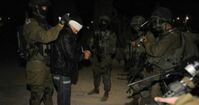
The Israeli occupation forces (IOF) at dawn Friday kidnapped a Palestinian citizen during from his home in Tulkarem refugee camp and clashed with local young men.
Local sources told a reporter for the Palestinian Information Center (PIC) violent clashes broke out in Marba’at Hanoun area of the camp between local youths and Israel soldiers.
Several citizens inside their homes suffered from inhaling tear gas which was intensively used by the IOF during the clashes, according to the sources.
The IOF also rounded up a young man called Mousa Ridwani after ransacking his home in the camp during the events.
Local sources told a reporter for the Palestinian Information Center (PIC) violent clashes broke out in Marba’at Hanoun area of the camp between local youths and Israel soldiers.
Several citizens inside their homes suffered from inhaling tear gas which was intensively used by the IOF during the clashes, according to the sources.
The IOF also rounded up a young man called Mousa Ridwani after ransacking his home in the camp during the events.
16 jan 2019
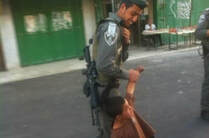
The Israeli police on Wednesday morning raided the family house of the Palestinian martyr Uday Abu Jamal in Jabal al-Mukabber town in Jerusalem.
Eyewitnesses said that the police, accompanied by intelligence officers, stormed the house, searched it, locked the family up in one room, and seized a computer and cell phones.
Abu Jamal's brother Mutaz, 23, has been held in Israeli jails for two years.
Eyewitnesses said that the police, accompanied by intelligence officers, stormed the house, searched it, locked the family up in one room, and seized a computer and cell phones.
Abu Jamal's brother Mutaz, 23, has been held in Israeli jails for two years.
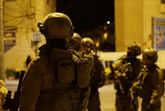
Israeli soldiers shot, on Wednesday at dawn, two young Palestinian men, including one who was shot with an expanding bullet, and abducted four others, in the northern West Bank governorate of Jenin.
Media sources said the soldiers invaded the Anza village, south of Jenin, and fired many live rounds, rubber-coated steel bullets and gas bombs at Palestinian youngster, protesting the invasion.
They added that the soldiers shot Ali Qassem Sadaqa with an expanding bullet in his leg, causing moderate-to-serious injuries, and Abdullah Kamal Barahma with a rubber-coated steel bullet.
Medics rushed the two wounded Palestinians to a hospital in Jenin and provided the needed first aid to several others who suffered the effects of teargas inhalation.
In addition, the soldiers abducted Amara Fashafsha, Morad Malaysha and Ala’ Khaliliyya, from Jaba’ town southwest of Jenin, and As’ad Mohammad Steiti, from Jenin refugee camp, after stopping them at two sudden military roadblocks on the Jenin-Nablus road.
The soldiers also invaded Jenin city, in addition to the villages and towns of Ejja, Zababda, Siris and Aaba, and drove around their neighborhood and alleys for a few hours, before withdrawing.
In Jenin refugee camp, the soldiers searched the home of Bassam Sa’adi, and interrogated him along with his family while conducting extensive and violent searches of their home.
Media sources said the soldiers invaded the Anza village, south of Jenin, and fired many live rounds, rubber-coated steel bullets and gas bombs at Palestinian youngster, protesting the invasion.
They added that the soldiers shot Ali Qassem Sadaqa with an expanding bullet in his leg, causing moderate-to-serious injuries, and Abdullah Kamal Barahma with a rubber-coated steel bullet.
Medics rushed the two wounded Palestinians to a hospital in Jenin and provided the needed first aid to several others who suffered the effects of teargas inhalation.
In addition, the soldiers abducted Amara Fashafsha, Morad Malaysha and Ala’ Khaliliyya, from Jaba’ town southwest of Jenin, and As’ad Mohammad Steiti, from Jenin refugee camp, after stopping them at two sudden military roadblocks on the Jenin-Nablus road.
The soldiers also invaded Jenin city, in addition to the villages and towns of Ejja, Zababda, Siris and Aaba, and drove around their neighborhood and alleys for a few hours, before withdrawing.
In Jenin refugee camp, the soldiers searched the home of Bassam Sa’adi, and interrogated him along with his family while conducting extensive and violent searches of their home.
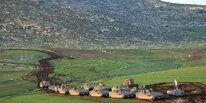
The Israeli army destroyed the crops of Palestinian farmers when its bulldozers opened a one-kilometer-long road in the area of al-Burj, Northern Jordan Valley, PNN reports.
Hundreds of Israeli soldiers later, Tuesday morning, carried out military drills on the agricultural land that belongs to Palestinians.
The army also forced 13 families in the area of Ibziq, north of Tubas, to leave their homes for the same purpose, according to WAFA.
Hundreds of Israeli soldiers later, Tuesday morning, carried out military drills on the agricultural land that belongs to Palestinians.
The army also forced 13 families in the area of Ibziq, north of Tubas, to leave their homes for the same purpose, according to WAFA.
